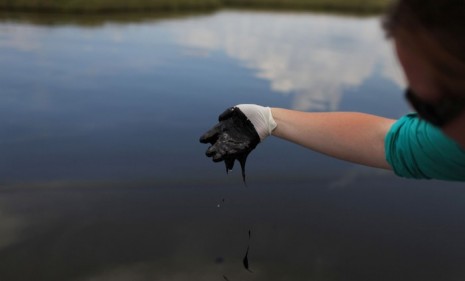Did the BP spill kill the Gulf sea floor?
Scientists think they've found some of the missing BP oil, spread in thick blankets on the seabed. That can't be good

A free daily email with the biggest news stories of the day – and the best features from TheWeek.com
You are now subscribed
Your newsletter sign-up was successful
One of the great mysteries of the massive BP oil spill in the Gulf of Mexico — "What happened to all the oil?" — is one step closer to being solved: At least some of it, perhaps a lot, sank to the ocean floor, according to University of Georgia researchers. Ominously, the two-inch-thick layers of oily sediment found in seafloor samples are resting over a layer of dead shrimp and small deep-dwelling creatures, raising the question: Did the BP spill kill the sea floor? (Watch an ABC report about the discovered oil)
How big is the oil blanket?
University of Georgia marine scientist Samantha Joye, on board the research ship Oceanus, says her team has found oil on the sea floor for dozens of miles in all directions from the now-capped BP oil well. "I expected to find oil on the sea floor," she says. "I did not expect to find this much." Ten of the 14 samples they've taken have oil, in some cases two-inches thick. The oil, Joye says, appears to have spread like "a blizzard, where the snow comes in and covers everything."
The Week
Escape your echo chamber. Get the facts behind the news, plus analysis from multiple perspectives.

Sign up for The Week's Free Newsletters
From our morning news briefing to a weekly Good News Newsletter, get the best of The Week delivered directly to your inbox.
From our morning news briefing to a weekly Good News Newsletter, get the best of The Week delivered directly to your inbox.
How do they know it's the BP oil?
They can't be sure until they check its chemical "fingerprint" against samples from the BP well. But Joye says that, given the size of the oil blanket, its freshness, and the "pieces of warm bodies" under it, she has little doubt that the fingerprints will match.
Why did the oil sink?
Nobody's quite sure, since oil normally rises in water. Scientists think the massive amount of chemical dispersant played some role, breaking up the oil into droplets too small to float. Joye also posits that floating oil is attaching onto the mucus excreted by the oil-eating organisms that have been voraciously cleaning up the spill, essentially creating an oil-transporting "slime highway from the surface to the bottom."
A free daily email with the biggest news stories of the day – and the best features from TheWeek.com
Why is it bad to have oil on the seabed?
The odd creatures on the seafloor — tiny marine worms and crustaceans, and "Halloween-scary fish with bulging eyes" — tend to reproduce less and live longer, so any impact on marine life "may stay around longer," says Louisiana State University oceanographer Robert Carney. David Hollander, from the University of South Florida, adds that "a lot of fish go down to the bottom and eat and then come back up," so if there isn't any food, that will be bad news for shallower dwellers, too.
Does this mean the U.S. government has been overly optimistic?
Some oceanographers say that, yes, the National Oceanic and Atmospheric Administration's estimates that half the oil has evaporated or been removed, and that much of the rest is being eaten by microbes, are overly rosy. But the vast Gulf of Mexico, most of its floor untouched by oil, appears to be faring better than many had feared. "As the weeks pass," say Leslie Kaufman and Shaila Dewan in The New York Times, evidence is mounting that "through a combination of luck (a fortunate shift in ocean currents that kept much of the oil away from shore) and ecological circumstance (the relatively warm waters that increased the breakdown rate of the oil), the Gulf region appears to have escaped the direst predictions of the spring."
Sources: AP, NPR, New York Times, Discover